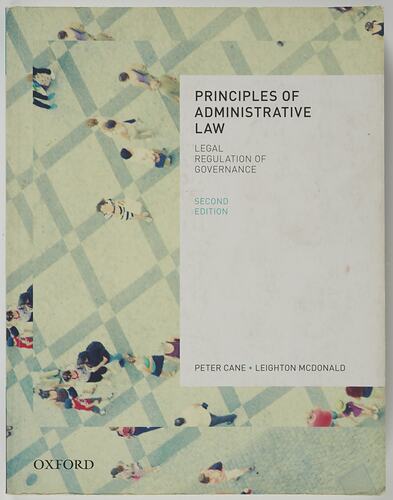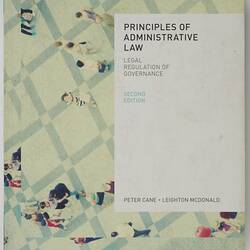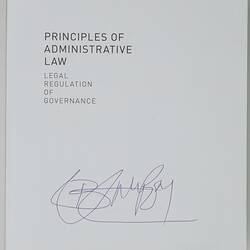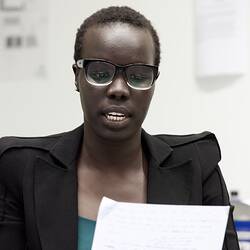Summary
Text book, 'Principles of Administrative Law', Oxford University Press, 2012. It belonged to Nyadol Nyuon and was one of her law degree texts. The book includes highlighting. Nyadol completed her Arts degree and then undertook her law degree.
This item is part of a collection of objects, documents and images relating to the life of Nyadol Nyuon, born of Sudanese parents in an Ethiopian refugee camp,and migrated from Kenya to Melbourne in 2005. She is now a prominent Australian human rights academic, lawyer, writer, media commentator, public speaker and activist. The collection includes: documents relating to Nyuon family's loans and loan repayments to finance the migration process, travel to Australia, and early housing; Nyadol's refugee camp activities certificates; material relating to Nyadol's academic and employment activities; humanitarian awards; the dress she wore when delivering her National Press Club speech in 2021 and a copy of the original speech; and a portrait of her father, freedom fighter William Nyuon Bany.
Significance
This collection documents the evolution of the migration experience and working life of Nyadol Nyuon, high profile Melbourne former refugee and Australian human rights lawyer, writer, media commentator and activist. The material traces Nyadol's early commitment to social justice through her activities in refugee camps in Ethiopia and Kenya, through to her university studies in Melbourne, law firm career and her humanitarian work in Australia. As a story relating to a former Sudanese refugee it also compliments the modest but significant stories of African diaspora in the collection including Nyabana Riek and Bul Akuel Bulkoch (south Sudanese), Nickel Mundabi Ngadwa (Congolese), Atong Atem (Ethiopian and south Sudanese), Amelia Sello and Sylvia Boyes Motherwell (South African), Bol Alcoc Buoi (south Sudanese Dinka) and the African Women's Group collection.
Nyadol's story both represents the trope of the 'good migrant' who arrives and achieves a successful career and contribution to Australian society, while also herself defying that trope through her high profile critique of Australian scoial justice, racism and how that has been perpetuated by politicians and the media. Nyadol also displays an ambivalence towards being the recipient of awards, both recognising the value of her visibility to inspire the next generation of refugees and people of colour in Australia, while also feeling uncomfortable with finding herself connected to Australia Day (for her Invasion Day) and being lauded for work that she believes to be essential and 'what anyone would do.'
Nyadol's story provides the opportunity to deconstruct these assumptions and seeming contradictions and demonstrate the complexity of multiple forms of identity (cultural, social, gender and work), identity politics and social expectations placed on refugees and migrants which can see them categorised and subsequently defying those labels.
More Information
-
Collecting Areas
Migration & Cultural Diversity, Politics & Society, Public Life & Institutions, Working Life & Trades, Home & Community, Leisure
-
Original Owner
-
Classification
Migration, Settlement - education & training, Tools & equipment
-
Category
-
Discipline
-
Type of item
-
Keywords
Sudanese Communities, Refugees, Immigration, Human Rights, Legal Industry, Lawyers, Racism, Working Life, Activism, Public Speaking, Public Debates, Public Events, Award Ceremonies, Awards, Speeches, Finances, Airlines, Air Travel, Luggage, Housing, Sporting Competitions, Basketball, Universities, University of Melbourne



